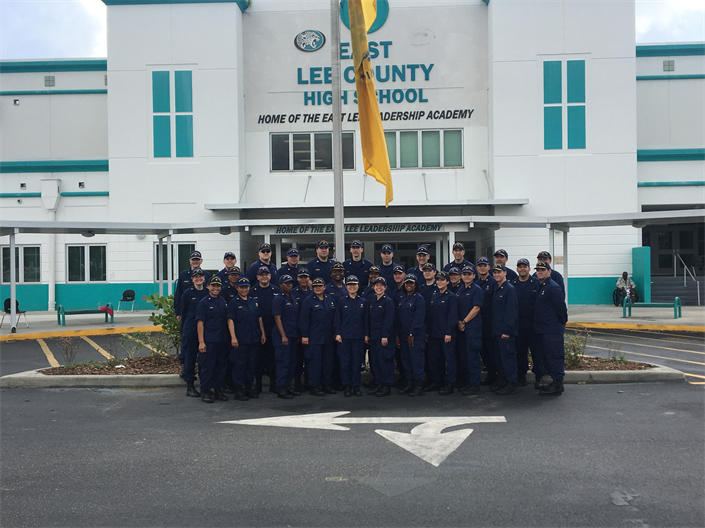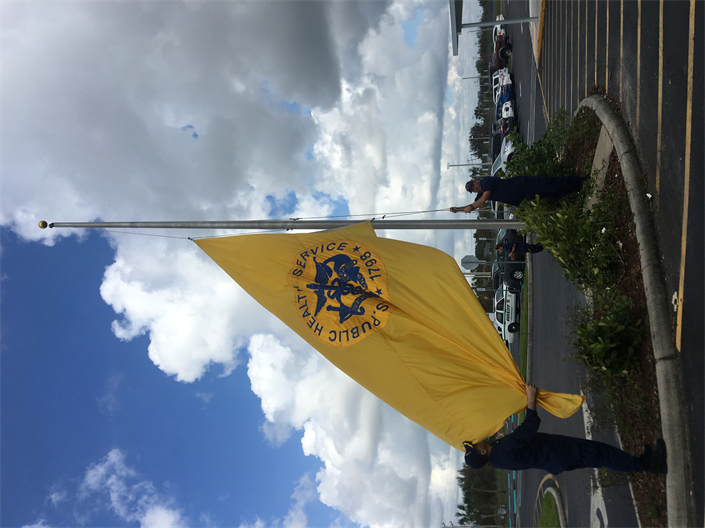Hurricane Maria and Hurricane Irma Deployment, 2017
By CDR Mark Miller, M.S., M.B.A., Ph.D.
Chief of Staff
National Institute of Environmental Sciences
National Institutes of Health
What was the mission of this deployment?
My deployment was broken into 3 unique missions:
- PHS1-Bravo - To provide medical services to residents of a medical shelter in the greater Ft Meyer, FL area following Hurricane Irma.
- RDF-VIPR - To provide medical services to patients in need of dialysis after evacuation from the USVI and PR in advance of Hurricane Maria.
- RDF-ATL1 - To provide medical services to residents of a medical shelter during transport from Miami, FL to Atlanta, GA and provide for their medical needs once in Atlanta.
What was your role during this deployment?
I served as the Unified Team Commander of a combined RDF/MHT/SAT for PHS1-Bravo and RDF-VIPR, and as Unified Team Commander for a combined RDF/MHT for RDF-ATL1. As Team Commander, I used a wide range of leadership skills, the most important of which was listening. From a scientific perspective, none of my duties were specific to a Scientist Officer but I feel my training as a scientist was of great benefit, particularly as it relates to quickly integrating diverse data streams and the building of interdisciplinary teams focused on a common outcome.
Was this your first deployment?
No.
What was the most important thing you learned during this deployment?
As a rookie Team Commander, I was learning constantly. The biggest lesson was to rely on the amazing officers around me. Our officers serve on response teams BECAUSE they are highly skilled and incredibly good at what they do. As a leader, I learned to make sure they have the resources they need and stay out of their way.
What did you enjoy the most about this deployment?
Seeing early and mid-career officers called upon to serve in roles they had not anticipated and succeeding beyond their own expectations!
What would you consider to be your major accomplishment stemming from this deployment?
In total while deployed, I was responsible for the safety and activities of over 160 officers as they provided care for 547 patients and family members at three different locations. Ensuring all officers return home safely after being completely successful in our mission to deliver competent and caring service to those truly in need was my greatest accomplishment.
What were some of the challenges that you experienced during this deployment?
On this deployment there were an abnormally large number of partners engaged with the response. Federal, State, Local, and NGO contributors were not always on the same page. Developing a unified tactical approach to a shared vision was always a challenge.
How did you prepare for the deployment – personally or work-wise?
Because PHS1 was in a holding pattern for several weeks for Hurricane Harvey, no specific preparations were really necessary.
Were there any classes, trainings that you had completed prior to your deployment that helped you in your current deployment?
The most beneficial training I had in preparation for my role was serving as a Site Commander on the Operation Lone Star training mission where my team provided medical service to 2,000 undeserved residents in the Texas border region. No classroom training can fully replicate the experience of hands-on training.
How was your post deployment/reintegration experience? Was it smooth to transition back to your daily life as experienced prior to deployment?
Thanks to my colleagues at work and family at home, my reintegration was extremely easy.
Do you have any advice or “pearls of wisdom” for fellow officers who are being deployed/interested in deploying?
We have all heard it before but...
BE FLEXIBLE, BE FLEXIBLE, BE FLEXIBLE!!!
Is there anything else you’d like to share regarding your deployment?
When deployed, all officers feel some level of stress and/or anxiety. As deployments get longer in duration, that stress begins to build and our capacity to handle additional friction diminishes. During a deployment try to be aware of and support the Officers on your team. Take a break, take a walk, and take care of each other!


Next Deployment Narrative Back to Deployment Narrative homepage